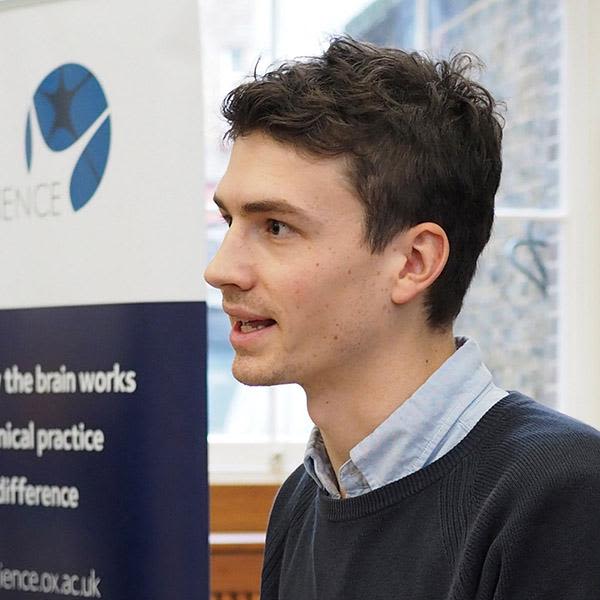
Research groups
Colleges
Sources of Funding





Jonathan Attwood
BA BMBCh PGCert AFHEA
Clinical Research Training Fellow
- I am a clinician specialising in neurology and a neuroscientist researching the relationship between traumatic brain injury and brain health.
- My research combines clinical, cognitive, neuroradiological, and neuropathological methods to gain a comprehensive view of the long-term effects of brain injuries.
- My aim is to find opportunities to mitigate these effects and to promote brain health and performance.
My PhD, in under 100 words...
During WWII, an Oxford College was transformed into a national Military Hospital for Head Injuries. I’m studying lifelong follow-up data from veterans treated at this hospital to gain unique insights into the long-term effects of brain injuries.
Which brain injuries lead to long-term physical and mental health problems? How does the brain recover from injury to perform cognitive tasks? How do mis-folded proteins spread through the brain to cause dementia after injury?
I’m addressing these questions to advance our understanding of brain injury and to support recovery among those at highest risk, including athletes and veterans.
Teaching
I am an Honorary Clinical Teaching Fellow at Oxford Medical School where I've taught for the last five years. I'm also a Medical Tutor at Harris Manchester College and an Associate Fellow of the Higher Education Academy in the UK.
My teaching experience ranges from anatomy demonstration to resuscitation training, but I now provide regular tutorials, seminars, and lectures in clinical neuroscience and the medical humanities. I've co-supervised a number of successful student projects, and I've been recognised by Teaching Excellence and 'Tutor of the Term' awards at Oxford.
I'm the director of a new concussion education course for medical professionals and a concussion awareness workshop for athletes, working with the world's leading concussion charity, the Concussion Legacy Foundation.
Sport
Sport has always played a big role in my life. I grew up playing any and every sport. As a student, I played hockey for the University of Oxford and cricket for Oxford Medical School. As a doctor, I still enjoy running and playing tennis. I've run the Paris Marathon, cycled from London to Paris, and completed the Blenheim Palace Triathlon. I think physical activity is one of the best tools we have to support brain health on a large scale.
Recent publications
-
(William) Ritchie Russell (1903–1980)
Journal article
Attwood JE. et al, (2024), Journal of Neurology
-
Alzheimer's disease-related pathology decades after penetrating traumatic brain injury
Journal article
Attwood J. et al, (2023), Journal of the Neurological Sciences, 455, 121360 - 121360
-
Clinical diagnosis of LGI1 antibody encephalitis in an 83-year-old woman
Journal article
Attwood JE. et al, (2021), BMJ Case Reports, 14, e237398 - e237398
-
Mixed Olfactory Neuroblastoma and Adenocarcinoma with In Situ Neuroendocrine Hyperplasia
Journal article
Attwood JE. et al, (2020), Head and Neck Pathology, 14, 792 - 798
-
London Trauma Conference 2019
Conference paper
(2020), Scandinavian Journal of Trauma, Resuscitation and Emergency Medicine, 28
Biography
I graduated from Oxford Medical School in 2017, after an exchange clerkship in Neurology at Harvard Medical School and a Neurosurgery attachment at the University of California San Francisco.
I got started in research as an honorary fellow while training in internal medicine. I published in the fields of neurology, neurosurgery, neuropsychology, and histopathology, and presented my research to the British Neuroscience Association, the Federation of European Neuroscience Societies, and the World Federation of Neurology.
In 2021, I gained an NIHR Academic Clinical Fellowship to combine neuroscience research into traumatic brain injury with a clinical training post in neurology at Oxford, and I completed a PGCert in Health Research. In 2023, I was awarded an MRC Clinical Research Training Fellowship to continue research full-time as a PhD student in clinical neuroscience. My research supervisors are Professor Gabriele De Luca and Professor Edward de Haan, and I am mentored by Professor Margaret Esiri.
Art
I first got into neuroscience by following an interest in the relationship between art and the brain. I performed my first experiment inside an art museum, and I believe that the arts can give us valuable insights into how the brain works. For more information please see the Art and Neuroscience Project.




